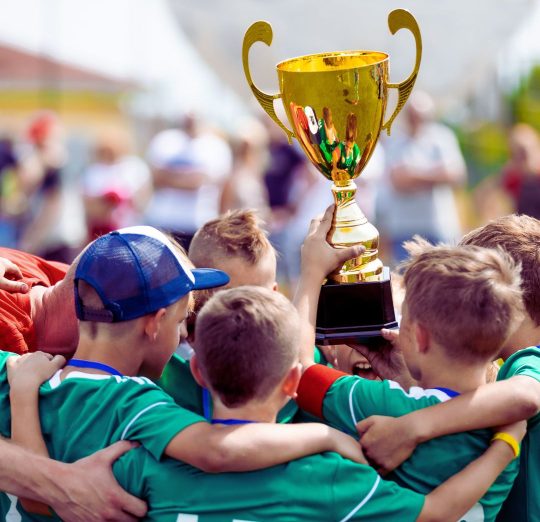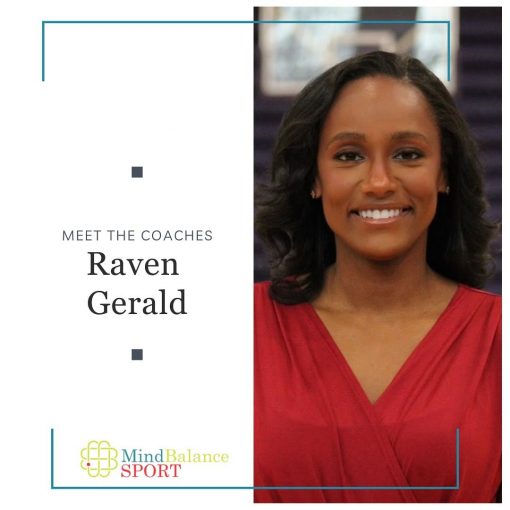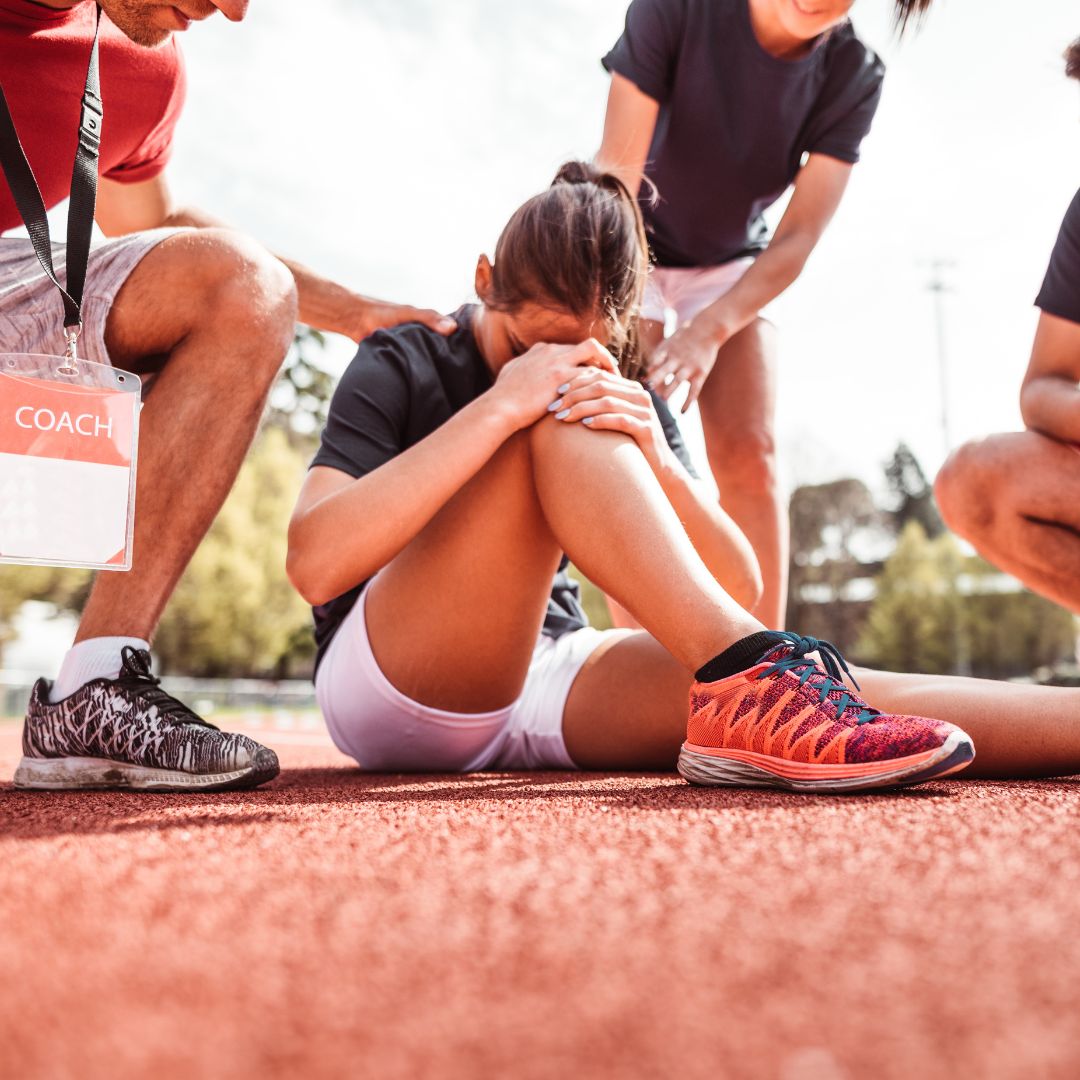Sports Psychologist in Hyattsville, MD
You want to work on your mental game, but how do you train your brain?
At MindBalanceSPORT, We Train The Other Half Of The Athlete.
You want to work on your mental game, but how do you train your brain?
Mental training does not get much media attention, but at MindBalanceSPORT we know it is a game changer. The mental skills you will learn at MindBalanceSPORT are generalizable in the classroom, in sport and in life!
We know that mental skills can be successfully taught, even at an early age.

Our Services
Meet the Team





testimonials
Athlete Stories: Real Comebacks, Real Results

Emma, a high school basketball player, tore her ACL in the middle of her junior season. After surgery, she struggled with self-doubt and fear every time she stepped back on the court. Through sport psychology training, she learned visualization techniques and confidence-building exercises that helped her regain trust in her knee. When she returned for her senior season, she didn’t just play—she led her team to the playoffs.

Carlos, a soccer player, suffered a stress fracture in his foot and had to miss half of his season. Sitting out was mentally tougher than the pain itself. We worked on mental engagement strategies to keep him sharp—studying game film, setting small rehab goals, and using mental imagery to stay ready. When he was finally cleared, his confidence never wavered.

Jordan, a track athlete, strained her hamstring before a major competition. She feared losing speed and falling behind competitors. Instead of focusing on what she couldn’t do, we redirected her energy toward mental preparation, using self-talk and goal setting to keep her confidence strong. When she returned, she set a new personal record.
EXCELLENTTrustindex verifies that the original source of the review is Google. It was a great help to my 14-year-old competitive volleyball player daughter. Raven was great to understand and connect with her from start to end. We will continue with our sessions as needed.Trustindex verifies that the original source of the review is Google. Great results! I’ve loved working with Paula. Our sessions have greatly improved both the physical and mental aspects of my tennis game. I’m playing better and having more fun! Highly recommend!Trustindex verifies that the original source of the review is Google. Our family had a wonderful experience with Paula Castro. We needed some additional confidence in a particular area/sport and Paula helped get us there. We know who to turn to if we need help again. She’s been a Blessing. Thank you, Paula!Trustindex verifies that the original source of the review is Google. I highly recommend MindBalanceSPORT. Our son works with John Howard. John is very caring, positive, and effective at working with teenagers. John is an adept listener and created an individualized plan tailored to our son’s personality. After just a few sessions with John, we noticed a significant improvement in our son’s motivation and mental approach to sports and life in general. Our son looks forward to meeting with John and tells us that he benefits immensely from their connection.Trustindex verifies that the original source of the review is Google. Paula Castro is an outstanding professional on the field. She has helped my daughter improve her confidence, preparation, and thanks to these session she feels more prepared and motivated. Paula takes the time also to share (what she can) and align with us as parents to be on the same page. Strongly recommended!Trustindex verifies that the original source of the review is Google. MineBalanceSPORT has quickly become the area's expert in sports psychology. Their reputation is well deserved given their incredibly thoughtful, scientifically based approaches to treating performance-related conditions, and I have only heard glowing, positive feedback from those who have engaged in their program. I will also add that Drs. Jones and Chirby presented to us (our group comprises of 15+ doctors and masters level clinicans) about their program and impressed us all with their level of expertise and passion for this field. I give them my highest recommendation.Trustindex verifies that the original source of the review is Google. Dr. Jones was beyond helpful to me throughout our time together. If you are an athlete and you need advice or assistance this is the place to come to. She completely changed my outlook and mindset in a time when I needed her most. I look forward to staying in touch with her and am forever thankful for her expertise.Trustindex verifies that the original source of the review is Google. Paula has been a huge help with my daughter Morgan coming off her injury. It’s been 18 months since she’s played basketball and she’s thriving because I know Paula is guiding her the right direction. As a mother, I’m extremely gratefulTrustindex verifies that the original source of the review is Google. If you are looking for Amazing Psychologists who can help support you in your sports performance, you need to call MindBalanceSPORT! Dr. Chirby and her colleagues are a wealth of knowledge, they have so many helpful techniques for mind balance, and they have so much compassion for the communities that they serve! Highly recommend!!!
Recovery
While Everyone Has A Physical Ceiling, There Is No Mental Ceiling.
How Sports Counselling in Hyattsville, MD Enhances Athletic Performance
How Sports Counselling in Hyattsville, MD Enhances Athletic Performance
Sports psychologists play a pivotal role in empowering athletes to optimize their performance, achieve their goals, and maintain overall well-being. While physical training focuses on muscle memory, strength, and endurance, the mental aspects of sports are equally important for achieving peak performance. Below is a detailed exploration of how sports psychologists contribute to enhancing athletic performance.
Addressing Performance Anxiety
One of the most common challenges athletes face is performance anxiety. Sports psychologists help athletes develop coping mechanisms and relaxation strategies to reduce stress levels during competition. Techniques such as:
– Breathing exercises: To regulate heart rate and promote calmness.
– Progressive muscle relaxation (PMR): To relieve physical tension caused by anxiety.
– Cognitive restructuring: Replacing negative self-talk with positive affirmations.
By managing anxiety effectively, athletes can perform at their best without being hindered by overwhelming nerves.
Building Mental Resilience
High-performance sports often involve setbacks such as injuries, losses, or failing to meet expectations. Sports psychologists work with athletes to cultivate mental resilience by fostering qualities like perseverance and emotional regulation: – Setting achievable short-term goals to build confidence over time. – Encouraging mindfulness practices, which help athletes stay present regardless of external pressures. – Teaching techniques for bouncing back quickly from failures or poor performances.
Enhancing Focus and Concentration
Peak performance requires unwavering focus during crucial moments in competition. Sports psychologists assist athletes in mastering concentration under pressure through methods like: – Visualization: Mentally rehearsing success scenarios to prepare for real-life challenges. – Attention control training: Managing distractions by focusing on controllable elements (e.g., breathing or strategy).
| Challenge | Technique Suggested | Outcome Expected |
| Distracted by audience | Narrow external focus (e.g., target or ball) | Improved task execution |
| Losing focus mid-game | Self-cueing using keywords | Regained concentration |
These strategies enable athletes to stay locked into their tasks despite environmental distractions or high stakes.
Promoting Confidence and Self-Belief
Confidence often determines how well an athlete performs under pressure. When doubts arise due to past failures or external criticism, sports psychologists provide tools to rebuild self-belief: 1. Helping set process-oriented goals rather than outcome-oriented ones. 2. Reinforcing previous achievements through reflective exercises. 3. Using positive imagery techniques that simulate successful outcomes.
By cultivating an inner sense of belief, athletes are better prepared mentally for competition.
Assisting with Team Dynamics
In team sports, individual performance impacts collective success. Sports psychologists improve team cohesion through communication workshops, conflict resolution strategies, and leadership development initiatives that foster collaboration within the group.
Through these approaches and more, sports psychologists become vital partners in helping both individual competitors and teams reach their full potential on and off the field while maintaining psychological wellness throughout their careers.
How Sports Psychologists in Hyattsville, MD Help Athletes Overcome Mental Barriers
Sports psychologists play a critical role in helping athletes address and overcome mental barriers that can hinder their performance. Whether dealing with anxiety, self-doubt, lack of confidence, or fear of failure, these professionals provide tools and strategies to foster mental resilience and unlock an athlete’s full potential.
Exploring Performance Psychology in Hyattsville, MD to Overcome Mental Barriers in Sports
- Performance Anxiety: Feeling overwhelmed under pressure during competitions or training sessions.
- Fear of Failure: Worrying about making mistakes or disappointing others.
- Negative Self-Talk: Repeatedly doubting one’s abilities or focusing on perceived weaknesses.
- Perfectionism: Setting impossibly high standards and fearing anything less than perfection.
- Loss of Motivation: Struggling to maintain drive after setbacks or prolonged periods of training.
Understanding these barriers is the first step toward addressing them effectively.
How Sport Performance Training in Hyattsville, MD Addresses These Challenges
- Identifying and reframing negative thought patterns.
- Teaching athletes how to replace self-defeating beliefs with positive affirmations.
- Breaking down long-term objectives into smaller, manageable steps.
- Focusing on process-oriented goals rather than solely outcome-based ones.
- Guiding athletes in mentally rehearsing successful performances.
- Using imagery techniques to build confidence and prepare for challenging scenarios.
- Introducing practices like deep breathing exercises, mindfulness meditation, or progressive muscle relaxation to reduce stress.
- Helping athletes develop pre-performance routines to instill a sense of control and focus during critical moments.
How a Sports Mental Coach in Hyattsville, MD Can Help Break Barriers Through Communication
Open communication between the athlete and the sports psychologist is vital for identifying underlying issues. By creating a safe space where athletes can express their thoughts without judgment, sports psychologists are better equipped to deliver tailored interventions.
Table: Example Interventions for Overcoming Specific Mental Barriers
| Mental Barrier | Intervention | Example Exercise |
| Performance Anxiety | Relaxation Techniques | Breathing exercises before competitions |
| Fear of Failure | Cognitive Restructuring | Writing down irrational fears & reframing |
| Negative Self-Talk | Positive Affirmations | Practicing daily affirmations |
| Perfectionism | Process-Focused Goal Setting | Focusing on effort instead of results |
| Loss of Motivation | Visualization & Goal Alignment | Envisioning long-term success |
Achieve Real-World Success with Sports Psychiatry in Hyattsville, MD
Many professional athletes credit sports psychologists with helping them overcome significant psychological hurdles. From maintaining composure under pressure during pivotal moments to recovering from injuries that affect confidence, these specialists provide essential support throughout an athlete’s career journey.
By addressing both the internal struggles and external pressures faced by individuals in high-stakes environments, sports psychologists empower athletes not only to perform better but also to enjoy greater mental well-being overall.
Techniques Used by a Sports Psychologist Near Me to Improve Focus and Motivation
Sports psychologists play a crucial role in equipping athletes with mental strategies to enhance focus and maintain motivation. These professionals employ an array of evidence-based techniques tailored to the athlete’s needs, helping them perform their best under pressure and sustain long-term commitment to their goals.
Visualization and Mental Imagery
- Improved confidence: Athletes who visualize success are often more self-assured in their abilities.
- Enhanced muscle memory: Repeating movements mentally can reinforce neural pathways associated with physical performance.
- Stress reduction: Familiarizing oneself with a scenario mentally can minimize anxiety when facing it in reality.
For instance, a sprinter might imagine themselves exploding off the starting blocks and crossing the finish line ahead of competitors. Incorporating sensory details—such as hearing the crowd or feeling the texture of the track—makes this technique even more effective.
Goal Setting
| Type of Goal | Description | Example |
| Outcome Goals | Focus on results or competition outcomes | Winning a championship |
| Performance Goals | Target measurable improvements in performance | Reducing lap time by 2 seconds |
| Process Goals | Concentrate on executing specific behaviors | Maintaining proper form during play |
Setting SMART goals (Specific, Measurable, Achievable, Relevant, Time-bound) ensures athletes remain focused on steady progress while staying motivated throughout their journey.
Mindfulness and Relaxation Techniques
- Lower pre-competition nerves.
- Improve concentration during high-pressure scenarios.
- Reduce burnout by fostering mental clarity.
For example, a tennis player might use controlled breathing between serves to stay calm and reset after losing a point.
Positive Self-Talk
Reframing negative thoughts into positive affirmations is another critical tool for keeping motivation high. Negative self-talk like “I can’t do this” can be replaced with empowering statements such as “I am prepared for this challenge.” This approach fosters resilience and builds self-belief even during setbacks.
Pre-performance Routines
- Reviewing personal goals or motivational cues.
- Performing light physical warm-ups.
- Engaging in brief visualization exercises.
- Repeating positive affirmations or mantras.
These rituals help reduce uncertainty and promote confidence before stepping onto the field or court.
By combining these techniques, sports psychologists enable athletes to sharpen their focus while staying intrinsically motivated across various levels of competition.
Techniques Used by Sports Psychologists to Improve Focus and Motivation
1. Goal-Setting Strategies
- Long-term goals: Overarching objectives, such as winning a championship or reaching professional status.
- Short-term goals: Smaller, actionable milestones that serve as stepping stones toward long-term achievements.
- Process-oriented goals: Emphasis on performance improvement rather than outcomes (e.g., improving running form instead of solely aiming for faster times).
Research suggests that clear, specific goals enhance intrinsic motivation while providing a criterion for self-assessment.
2. Visualization and Mental Imagery
- Building confidence through repeated mental success.
- Preparing for high-pressure situations by imagining various competitive scenarios.
- Improving motor skills by “practicing” movements in the mind.
For example:
| Sport | Example of Visualization | |—————|———————————————————–| | Basketball | Visualizing a perfect free throw shot under crowd pressure | | Swimming | Mentally walking through every stroke of the race lap | | Tennis | Imagining precise serves hitting desired court locations |
3. Mindfulness and Relaxation Techniques
- Breathing exercises: Deep breathing to lower heart rate and reduce stress.
- Progressive muscle relaxation (PMR): Systematically tensing and relaxing different muscle groups to release physical tension.
- Meditation practices: Promoting mental clarity and emotional regulation.
These approaches contribute to better concentration during competition while minimizing psychological fatigue.
4. Self-Talk Optimization
“I always mess up under pressure.”
“I’ve trained hard, so I’m prepared to handle challenging moments.”
Replacing negative thoughts with affirmative ones fosters resilience and boosts confidence over time.
5. Developing Pre-performance Routines
- A basketball player may follow a strict warm-up sequence involving stretches, three-point shots, then free throws.
- A golfer might rehearse their swing mechanics before addressing the ball every time.
Such rituals enhance consistency while calming nerves before high-stakes situations.
By incorporating these evidence-based techniques into their routine, athletes can overcome mental challenges, increase motivation levels, and achieve peak performance both individually and within team settings.
The Impact of Sports Psychology on Team Dynamics and Communication
Sports psychology has an essential role in enhancing team dynamics and fostering effective communication among athletes. Whether it is a professional team or a group of amateur players, mental harmony within the team can significantly influence the overall performance. Sports psychologists specialize in addressing interpersonal challenges and helping teams develop strategies to enhance collaboration and synergy.
Key Areas Where Sports Psychology Influences Team Dynamics
- Trust is foundational for any successful team. Sports psychologists often focus on exercises that promote mutual understanding and respect between teammates.
- Activities such as trust-building workshops or open-dialogue sessions can help reduce conflicts and establish stronger bonds.
- Disagreements are inevitable in any group setting, including sports teams. Psychologists utilize conflict resolution techniques to help teammates navigate differences productively.
- Techniques like mediation, active listening training, and reframing negative interactions allow teams to resolve disputes without long-term damage to relationships.
- Team cohesion refers to how well members work together towards shared goals. Psychologists analyze the factors contributing to or hindering cohesion, such as personality clashes or unclear roles.
- Interventions may include structured goal-setting exercises, role clarification workshops, or team mindfulness practices.
Improving Communication Through Sports Psychology
- Verbal Communication Skills
Effective verbal communication ensures that teammates understand each other’s intentions during critical moments in a game. - Training sessions often focus on clarity of speech during high-pressure situations.
- Coaches are also guided on how to provide constructive feedback without discouraging players.
- Non-Verbal Communication Awareness
Body language plays a significant role in sports performance. Psychologists educate athletes about non-verbal cues such as posture, facial expressions, and gestures that can influence team morale. - Developing awareness of positive non-verbal behaviors can boost confidence among teammates.
Tools & Techniques Used by Sports Psychologists for Teams
| Technique | Purpose | Example Activity |
| Goal-Setting Workshops | Align individual/team objectives | Creating SMART goals for upcoming games |
| Mindfulness Exercises | Improve focus & reduce stress | Group meditation sessions |
| Visualization Training | Enhance collective problem-solving | Visualizing strategies against opponents |
| Role Clarification | Minimize confusion over responsibilities | Defining clear roles during practice drills |
Benefits of Improved Team Dynamics
- Increased trust contributes to higher morale on and off the field.
- Smoother interactions reduce stress levels among players.
- Effective communication minimizes errors during crucial moments in games.
- Enhanced understanding fosters long-term relationships among team members.
The integration of sports psychology into team settings proves invaluable by creating an environment where individuals thrive collectively while achieving shared success.
When Athletes Should Seek the Guidance of a Sports Psychologist
Sports psychology has become an essential part of athletic training and competitive success. Yet, many athletes remain uncertain about when to seek help from a sports psychologist. Understanding the right circumstances to consult these professionals can make a significant difference in an athlete’s performance and overall well-being.
Common Situations Where Athletes Benefit from Sports Psychologists
- Performance Anxiety:
Struggling with nerves before or during competitions is common, but when anxiety begins to impair performance, external guidance may be necessary. - Loss of Motivation:
Athletes who feel burned out or lose sight of their goals can use strategies provided by sports psychologists to regain their drive and focus. - Prolonged Slumps:
Extended periods of poor performance often have psychological roots. A sports psychologist can help uncover and address these issues. - Recovery from Injury:
Injuries can be mentally taxing, leading to fear, frustration, or doubt. Sports psychologists assist in building confidence and coping mechanisms during recovery. - Transition Periods:
Whether transitioning from amateur to professional levels or retiring from sports altogether, athletes often face emotional challenges during career shifts.
Signs It’s Time to Seek Help
| Symptom/Behavior | Possible Psychological Challenge |
| Difficulty concentrating | Mental fatigue or lack of focus |
| Overthinking during games | Performance anxiety |
| Fear of failure | Low self-confidence |
| Avoiding practices/events | Loss of motivation |
| Feeling overwhelmed | High stress levels |
If one or more of these indicators persist over time, seeking professional support could be crucial for both mental health and athletic success.
Benefits of Early Intervention
- Enhanced self-awareness
- Faster recovery times (both physical and mental)
- Improved stress management
- Stronger resilience in high-pressure situations
On the other hand, delaying intervention may lead not only to declining performance but also increased risks related to mental health disorders such as depression or chronic anxiety.
Encouraging Open Communication
Athletes should never feel isolated in their struggles. Coaches, teammates, and family members play vital roles in encouraging individuals to seek help when needed. By fostering open communication within teams and communities, the stigma around seeking psychological support diminishes significantly.
Ultimately, consulting a sports psychologist is not just for those facing problems—it’s also for those aiming for optimal performance in all areas of their game. Recognizing the right time for this step is key for long-term growth as an athlete.








